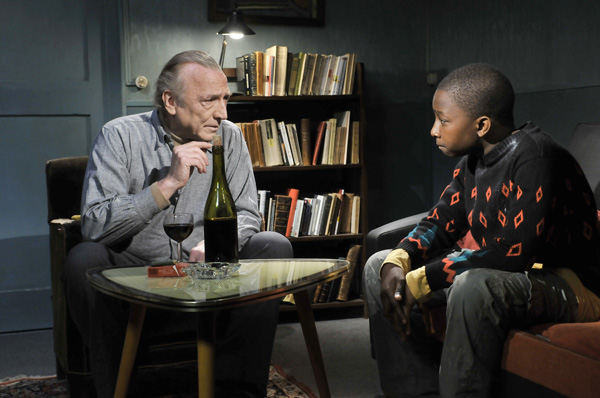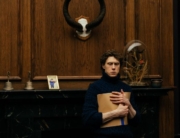
André Williams, left, and Blondin Miguel bond (Photo: The Film Society of Lincoln Center)
Written, Produced & Directed by Aki Kaurismaki
Released by Janus Films
French with English subtitles
Finland/France/Germany. 93 min. Not rated
With André Wilms, Kati Outinen, Jean-Pierre Darroussin & Blondin Miguel
Aki Kaurismaki does a remarkable job as a formalist here. His new film takes place in the French port town of Le Havre in what could be the present day, or any of the four preceding decades. The extensive use of sets over actual locations, stage lighting over naturalism, timeless wardrobe and production design, all combine with the equally timeless issue of immigration to create a unique film world that’s somehow recognizable and strange at the same time. He employs the fundamentals of cinema to create a humanistic, yet haunting, portrait of an elderly artist-turned-shoeshiner, Marcel Marx (André Wilms), who shelters the youngest of a group of West African refugees, a boy of about 12, Idrissa (Blondin Miguel). He houses and feeds him until he is able to board a cargo boat bound for London, where he can finally reunite with his mother.
Like the best of Rainer Werner Fassbinder’s films, the surface has a balmy, dispassionate air, despite the strong emotions embedded within its fabric. The constructed sets fool us into thinking there is fakery somewhere, all the while a host of beautifully rendered characters surprise us with their very realistic stories. Kaurismaki—like Fassbinder, and before him Douglas Sirk—gives us something that looks and feels like a “movie,” but the themes of which are actually more like real life than we expect. Suddenly, this uncomplicated story of an old man, his young friend, the community that helps protect the youth, and the pursuing inspector Monet (Jean-Pierre Darroussin) takes on a greater significance than we, disarmed, expect. This is a delightful, and delightfully memorable, film.
It’s as if Kaurismaki has made the movie he would have wanted to see as a kid. It’s full of artful one-liners (he is as sharp a dialogue writer as you’ll find), as when Marcel’s wife Arletty (Kati Outinen) dismissively quips abut the likelihood for a medical miracle: “Not in my neighborhood.” Or a comment on the undeniable phenomenon of northward migration: “The Mediterranean has more birth certificates than fish.” For Kaurismaki, immigration is inevitable, and is more important as a humanistic issue than anything else. Those for whom undocumented immigration is a problem (especially in this country recently) seem to consistently forget that migration is caused by free market capitalism, and if corporations employing undocumented workers aren’t held responsible, then why should suspected “illegals” be arrested and detained? Kaurismaki patently questions European policy when one of the officers explains the assault rifle he carries: “Ministry of Interior’s orders.”
With our elderly hero dead in the sights of this exacting inspector’s investigation, we see a sympathetic artist pitted against the unrelenting state. The community support notwithstanding, I like the confidence instilled by this old resourceful shoeshiner. Le Havre is a David and Goliath story at its heart, though not without sadness. For all the work Marcel accomplishes, he only saves one boy. The rest of Idrissa’s traveling companions are scattered, ending up in makeshift refugee camps, in prison, or deported back to their unforgiving country. Humanism is a nice turn, but until it’s instituted in a larger way, i.e. in corporate and government policy, Kaurismaki allows us to see here that its effectiveness is questionable.






Leave A Comment